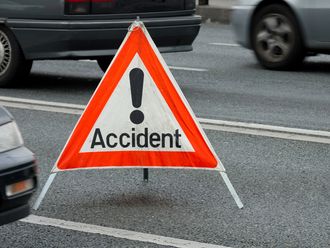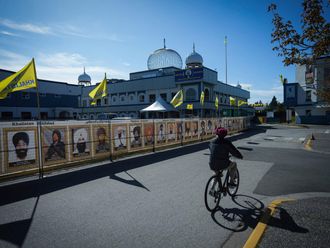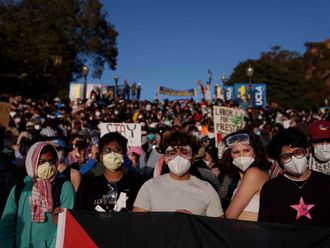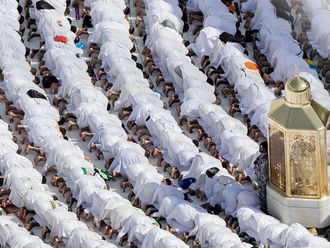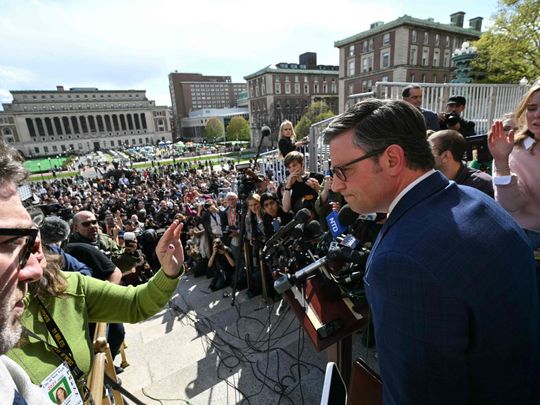
Dubai: Pro-Palestinian protests have intensified at leading US colleges, spanning from Columbia University in New York to Harvard, Yale, the University of Texas, and the University of Southern California in Los Angeles.
The demonstrations, which began last week, spread to campuses nationwide, sparking reactions from prominent figures, including a senior Republican leader who suggested calling in the National Guard.
US House Speaker Mike Johnson made these remarks on Wednesday during a visit to Columbia University, the epicenter of nationwide student demonstrations against Israel’s actions in Gaza. At Columbia’s Manhattan campus, Johnson faced heckling and booing from protesters.
“As Columbia has allowed these lawless radicals and agitators to take over, the virus of antisemitism has spread across other campuses,” Johnson said, urging authorities to arrest violent protesters and threatening to cut federal funding to universities that fail to maintain order.
Johnson told reporters that if the demonstrations were not swiftly contained, it would be “an appropriate time for the National Guard” to intervene.
The National Guard is unique among the US armed forces in that it can perform state and federal functions. The guard is generally called up to respond to state-level emergencies, such as natural disasters.
But, unlike most of the other military forces, it can also serve a domestic law enforcement role. Additionally, the president can deploy the guard to serve missions overseas, which has happened more frequently in recent years, including to Afghanistan, Iraq, Poland, and the Horn of Africa.
The guard’s organization is somewhat unique. It consists of two parts: the Army National Guard and the Air National Guard, which are both considered US military reserve components but are distinct from the army and air force reserves. The guard is overseen at the federal level by the National Guard Bureau, the head of which is a four-star general and member of the Joint Chiefs of Staff, the military’s top advisory body.
As of fiscal year 2022, there were 434,689 guard members [PDF] in total, serving in fifty-four separate organizations across the fifty states; Washington, DC; and three US territories: Guam, Puerto Rico, and the Virgin Islands.
Many members of the National Guard serve part-time while holding civilian jobs or attending school. Guard members commit to one weekend of training per month plus a minimum of a few weeks of service per year. Most members serve in the states in which they live.
The United States has a grim history of employing the military to quell campus protests. In 1970, the Ohio National Guard opened fire on antiwar protesters at Kent State University, killing four students and wounding nine others.
The protesters have rallied around demands for colleges to divest from companies with ties to Israel, an end to US military aid, and a halt to disciplinary action against protesting students.
In Boston, police moved to break up a protest led by Emerson College students outside the State Transportation Building early Thursday, moving in on students who formed a human wall and raised umbrellas, according to video footage from the scene.
A total of 108 arrests were made, and four officers were injured, Sgt. Detective John Boyle of the Boston Police Department said in an email. He said there were no reports of injuries among the protesters in custody.
Other footage from the scene showed onlookers shouting as police removed students or pushed them to the ground, a sea of tents behind them.
UNIVERSITY OF SOUTHERN CALIFORNIA’S ALUMNI PARK: On Wednesday police confronted the crowd and ordered the dismantling of the encampment. Several people were arrested on Wednesday
UNIVERSITY OF TEXAS, AUSTIN: More than 30 people were arrested on Wednesday. Police used bikes and riot gear to push students back
COLUMBIA UNIVERSITY, NEW YORK: The protests began at Columbia University, where more than 100 arrests were made last week. On Wednesday, the board of trustees released a statement saying they strongly supported President Nemat Shafik, who has faced calls for her resignation
HARVARD UNIVERSITY, BOSTON: The encampment in Harvard Yard mounted by pro-Palestinian student organisers entered its second day on Thursday, with organisers saying they were intent on remaining at the site until the university met their demands
The California State Polytechnic University, Humboldt campus will remain closed over the weekend as protesters continue to occupy two buildings. Work and classes will remain remote. There are “unidentified non-students” occupying buildings
In Washington, encampments have been set up at Georgetown University and George Washington University (GW) and American University. A walkout is planned this afternoon at Georgetown
Protests have also been taking place at Yale, MIT, Brown, Stanford and Johns Hopkins universities.
The escalation of protests resulted in the arrest of hundreds of demonstrators at various universities, including New York University, Brown University in Providence, the University of Minnesota, the University of Texas, and the University of Southern California.
The political ramifications reached the White House, where press secretary Karine Jean-Pierre emphasised President Joe Biden’s support for free speech, debate, and nondiscrimination on college campuses.
NBC reported that the FBI is coordinating with universities over anti-Semitic threats and possible violence in connection with the ongoing wave of protests.
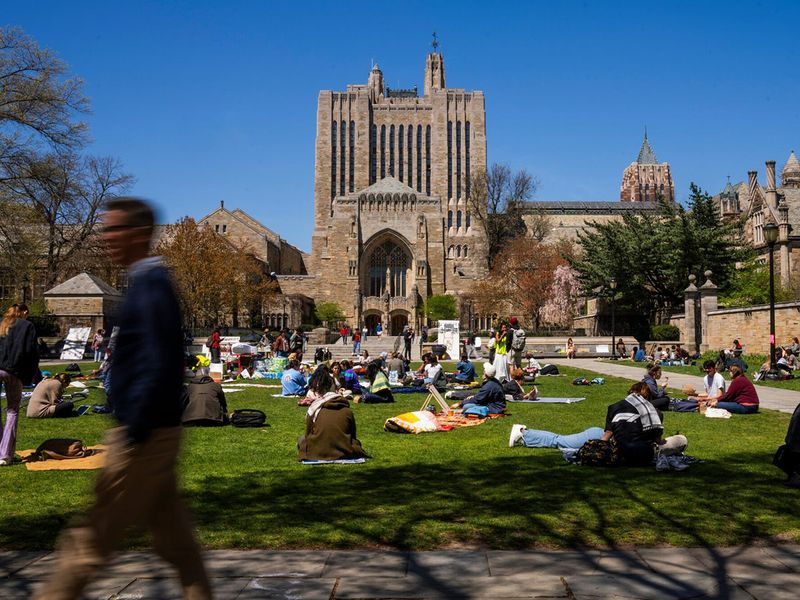
Some of the campus protests taking place coast to coast were met with shows of force from law enforcement.
In Texas on Wednesday, state highway patrol troopers in riot gear and police on horseback broke up a protest at the University of Texas in Austin. The Texas Department of Public Safety posted on X that 34 people had been arrested.
The University of Southern California declared its campus closed. The LAPD said that 93 people were arrested for trespassing.
Students also demonstrated at Brown University in Providence, Rhode Island, the University of Michigan in Ann Arbor, the Massachusetts Institute of Technology in Cambridge and California State Polytechnic in Humboldt.
But pro-Israel supporters, and others worried about campus safety, have pointed to anti-Semitic incidents and argued that campuses are encouraging intimidation and hate speech.
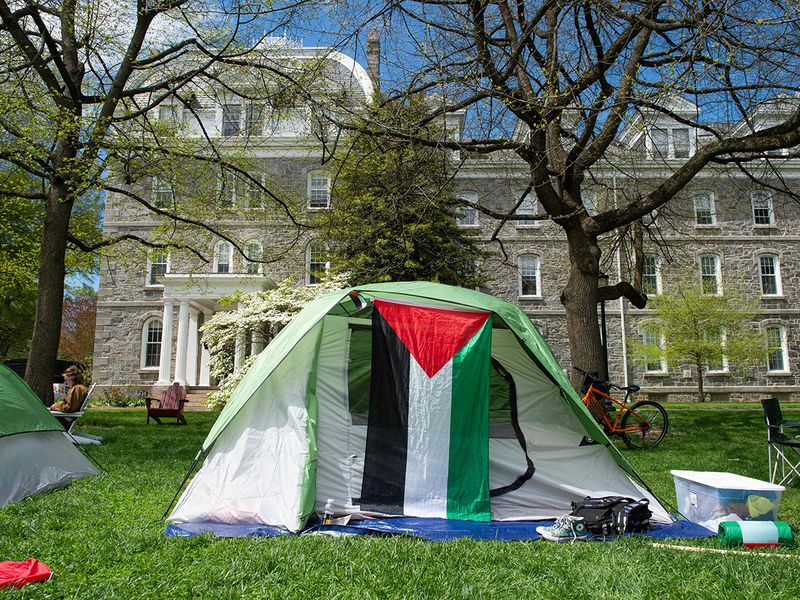
‘Down with occupation’
Police were on scene in Los Angeles after hundreds of students began what they called an occupation on the campus of the University of Southern California.
Students chanted “Free free Palestine” as well as the controversial slogan “From the river to the sea, Palestine will be free,” which some interpret as calling for the destruction of the state of Israel.
“We’re all just trying to advocate for our brothers and sisters in Palestine who just don’t have voice right now,” biology student Yaseen Al Magharbel told AFP.
The university said it was closing the campus to outside visitors, though classes and other activities would continue.
Students have also launched protests at schools including Yale, MIT, UC Berkeley, the University of Michigan and Brown.
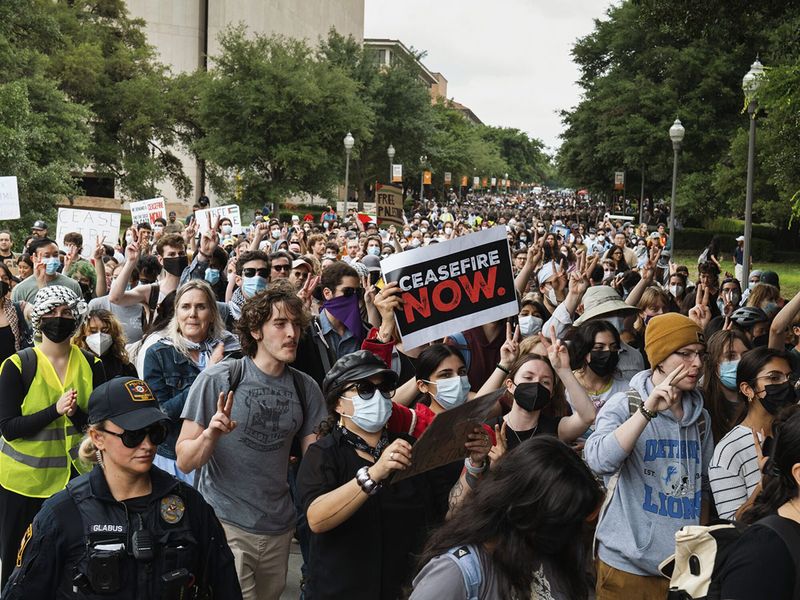
Social media images showed an encampment taking shape at Harvard University.
Classes were moved online and other on-campus activities canceled at California State Polytechnic University, Humboldt, after protesters barricaded themselves in a campus building.
More than 130 people were arrested at a pro-Palestinian protest at New York University Monday night.
And police at the University of Minnesota reportedly detained nine people at an encampment.
Columbia deadline extended
Before Johnson’s visit to Columbia an uneasy truce was in place between students and officials.
The university had set a deadline of midnight Tuesday to disperse, but as more people joined the protest the school gave a 48-our extension, students said on social media.
They agreed to the ongoing talks after the school promised not to call the police or National Guard, organizers with Columbia University Apartheid Divest said.
“We fear that Columbia is risking a second Jackson State or Kent State massacre,” the group said in the social media post.
In 1970, demonstrations at Kent State University in Ohio were met with deadly force from the National Guard, who fired into a crowd, killing four unarmed students and wounding nine.
-- With inputs from agencies


